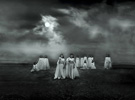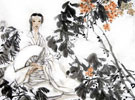The Republican Era (1911-1949): Translating Sexuality
The late-nineteenth and early-twentieth century saw China’s door being opened to the invading Western colonial powers, the end of the imperial dynastic tradition, and the founding of a new republican state and the building of a modern nation. The historical period also witnessed the introduction of Western scientific sexology and social Darwinism by China’s elite intellectuals. In the 1910s and 20s, apart from the introduction of such notions as gender, sex and sexuality, the term tongxing’ai (same-sex love; homosexuality) entered the Chinese language from the European sexology (particularly from writings by the German Richard von Krafft-Ebing and the Englishmen Havelock Ellis and Edward Carpenter), often through Japanese sources (exemplified by the term doseiai, meaning “same-sex love”. The Chinese character tongxing’ai shares the same written form with the Japanese kanji doseiai.). Scentia sexualis took the place of ars erotica and began to map sexual desires and identities in Chinese society in new ways.
In translating Western sexology, psychology and psychoanalysis, China’s May Fourth intellectuals and translators did not consider homosexuality a biologically-determined identity. Tongxing ai (or tongxinglian; or tongxing lian’ai) was often considered relational and situational, and was often conceived of as a modality of love or an intersubjective rapport rather than as a category of personhood. It was at the same time a type of true love, a temporary aberrance which occurred in particular social contexts and modes of sociality, or a habit that can be acquired under certain circumstances and thus can also curbed. The pi (obsession) considered personal in pre-modern China became a social problem. Bodies began to be linked to implicit claims of psychiatric reasoning and nationalistic significance in the new episteme. Concomitant with the heated public debate on homosexuality in middle-class periodicals, representations of same-sex love, especially short stories and pictures regarding female homoeroticism, abounded in glossy magazines in urban China during the era.
The Maoist Era (1949-1979): “Comrade” the Political Subject
Considered as “feudal remnants”, homosexuality, together with other non-marital and non-heteronormative sexual practices such as polygamy and prostitution, was “eradicated” from China’s public discourse in the early 1950s. Records of homosexuality during the Maoist era were scant, fragmentary and contradictory: while some reminisced same-sex intimacy and camaraderie with homoerotic sentiments, others accused the Maoist regime of persecuting people who engaged in same-sex practices on the charge of jijian (sodomy) and liumang (hooliganism; hoodlum). Liumang, literally “the flowing common people”, reveals the tension between the desired stability of the socialist subjectivity from the revolutionary hegemony and the impossibility of such stability.
The Maoist state places high priority on family as a basic social unit and on gender and sexual norms as essential to the formation of the socialist subject. Tongzhi (“comrade”) was the legitimate subject in the Maoist era: it was a politicized subject, in that the production of bodies was inextricably related to the nation-state and the revolutionary hegemony. The socialist tongzhi should not be seen as asexual or anti-sexual. In fact, even in the most ascetic years during the Cultural Revolution (1966-1976), there was some freedom among young people to talk about sex and to engage in it. More importantly, the socialist tongzhi subject broke away from the “bourgeois” type of individual, hierarchical and consumerism-oriented subjectivity. It experimented on mapping bodies that did not take the individual and its sexuality as its core and imagining a utopia of social egalitarianism. In a way, the socialist tongzhi was intrinsically queer.
The Maoist era has long been gone, and many people look back on the bygone era with ambivalent feelings. However, its modes of subject formation, including collectivism, mass mobilization, voluntarism, social activism, camaraderie, association of the individual identity with the state, as well as a longing for social equality and justice still have their legacies felt in LGBTQ identities and politics in China today.
The Reform Era (1979 to present): “Comrade” the Sexual Subject
In the late 1970s and early 1980s, China began to depart from the Maoist politics of “class struggle” to the emphasis on developmentalism, rationality and pragmatism in the Deng Xiaoping era. The state policy of “reform and open-up” (gaige kaifang) opened China to the global economy as well as to liberal and neoliberal discourses. Along with the emergence of the individual subject, discourses on gender and sexuality began to surface in Chinese society in the 1980s. Scienticism, anti-radicalism and the scholastic turn in the 1990s produced increasing scholarship on homosexuality studies, among which were Li Yinhe, Liu Dalin and Pan Suiming’s sociological research, Zhang Beichuan and Lu longguang’s medical research, and Fang Gang’s journalistic writing. The rise of mass media and popular culture, the discovery of HIV/AIDS, the emergence of a middle class, youth culture and urban culture in the 1990s all contribute to the construction of the contemporary LGBTQ identity.
In 1997, liumangzui (hooliganism) was deleted from China’s Criminal Law; in 2001, tongxinglian (homosexuality) was deleted from the third edition of Chinese Classification of Mental Disorder (CCMD–3). The two symbolic events were considered decriminalization and depathologization of homosexuality in mainland China. With the slow relaxation of the state control, there have been increasing social movements and identity politics championed by LGBTQ individuals and groups. Some queer public events have been held, including queer film festivals held in Beijing since 2001, queer art exhibition held in Beijing in 2009, and Shanghai pride parades held in Shanghai in 2009. Increasing LGBTQ venues have appeared in Chinese cities, including bars, clubs, saunas, and community centres. Meanwhile, the Internet and other forms of digital technology have provided alternative queer spaces for LGBTQ people to articulate their identities and to build their communities.
With the booming LGBTQ public culture in China today, more and more people have subscribed to the identity category of tongxinglian (same-sex love). Meanwhile, the term tongzhi (comrade) began to gain popularity in mainland China since the late 1990s. Originally a socialist identity category and first appropriated by a Hong Kong queer activist in 1989, tongzhi has been one of the most popular terms to refer to LGBTQ people in the Chinese-speaking world. According to Hong Kong queer scholar Chou Wah-shan, tongzhi is characterised by qing (deep sentiment or passion) instead of xing (sex). Instead of “coming out”, tongzhi should adopt a “coming home” strategy, that is, to incorporate same-sex relationship in the framework of family and kinship. Gao Yanning points out that tongzhi, rather than “gays and lesbians,” are the major same-sex subjects in China, and that tongzhi is characterised by ‘getting into heterosexual marriages’ (chengjia) and ‘staying closeted’ (bu chugui).
While Chou’s theorization of tongzhi may sound overly romantic, and Gao’s may sound reductionist, the term tongzhi should inspire us to rethink LGBTQ identity and politics that are both influenced by, and at the same time can pose a challenge to, transnational LGBTQ movement and neoliberal mode of subjectivity. For one thing, tongzhi the sexual subject is not anti-social. The Western type of identity politics, represented by the imperative to “come out” and the Stonewall type of confrontational politics, may not be reproduced in China as a result of China’s specific social and cultural context. For another, instead of adopting an antagonistic attitude towards family, marriage and kinship, LGBTQ people in China have been inventing multiple and creative forms of family, kinship and intimacy that do not fall into heterosexual norms. Addressing each other in familial terms such as gege (older brother), didi (younger brother), jiejie (older sister) and meimei (younger sisters) registers intimate modes of sociality and relationship. Marriages of convenience between gays and lesbians help to redefine heterosexual marriages and families. Tongzhi does not designate an “authentic” identity that needs to be discovered and outed; rather, it points to identities and sexualities as performative and situational. Tongzhi is not anti-social; instead, it works within the heterosexual institutions of family, marriage and kinship by queering the heterosexual norms.










